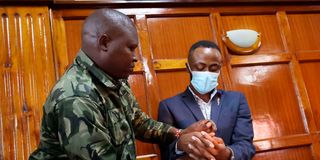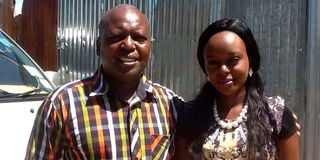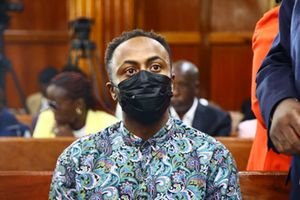
Joseph Irungu alias Jowie at the High Court in Nairobi on March 13, 2024 where he was handed a death sentence for the murder of businesswoman Monica Kimani at Lamuria Garden apartment on September 19, 2018.
In the end, it all boiled down to manner, consequence and character as Justice Grace Nzioka sent Joseph Irungu, alias Jowie, to the gallows for the murder of businesswoman Monicah Kimani in her Nairobi flat six years ago.
The three issues that sounded simple and inconsequential as the judge read them out in court, but which, in the end, determined the fate of a man who caught the attention of the country six years ago with his bluster, arrogance and haughtiness, were the manner in which he killed his victim, the consequences of his actions, and his character as, first, a human being and, second, a member of society.
He sat pensively in the dock, a blue cotton mask covering a large part of his face, such that it was hard to read his emotions as Justice Nzioka painstakingly set the stage for his sentencing.
His eyes kept darting up and down the courtroom. They were forlorn and lifeless, the empty windows to a soul that seemed to be imploring for help or mercy or both as the minutes wore on.
Across him, about 10 metres away, Justice Nzioka towered over the courtroom, her demeanor and the careful, measured delivery of her sentence serving as a poignant reminder of the heavy matter at hand.
Every word she uttered seemed to be well thought-out, every sentence slicing the tense air inside the packed courtroom with a sense of foreboding and apprehension.
Jowie looked beaten compared to the other times he had been presented in court, as if somehow he had resigned to his fate. He was lonely in the dock as his co-accused in the murder, former journalist Jacque Maribe, was acquitted the last time they appeared together on February 9 this year.
To explain the sentence she was about to mete on Jowie, justice Nzioka started with the manner in which he killed Monicah, warning beforehand that “every human being has a right to life”.

Joseph Irungu alias Jowie is handcuffed at the High Court in Nairobi on March 13, 2024 after receiving a death sentence for the murder of businesswoman Monica Kimani on the night of September 19, 2018.
“The person who perpetuated this murder cut the throat of the deceased,” Justice Nzioka said, noting at the same time that the prosecution had successfully proven that the offender “was not an amateur”.
She then peered into the court and, every so calmly, noted that Jowie had himself confessed that he had been trained by a police academy in Dubai.
But perhaps it was the manner in which Monicah was killed that dealt a devastating blow to Jowie.
On September 20, 2018, her lifeless body was found inside a bathtub in her apartment. Her throat has been slit and her hands had been tied across her chest with tie wraps, a type of plastic fastener that is primarily used to bind electrical cables and wires.
The cruel nature of how she had died sent shockwaves across the nation, with detectives puzzling over certain aspects of a crime they described as having been carried out by a “highly trained killer”.
They, for example, wondered why Ms Kimani appeared not to have struggled as her hands were tied behind her back and her mouth taped shut.
Her body did not have injuries consistent with a big struggle against an assailant, and there were no signs of struggle in the apartment, as one would expect. A police source told the Nation at the time that Ms Kimani was tied up “like a goat”.
“We know they had been taking wine,” the source noted, and wondered: “Was she drugged?”
The drugging angle would be consistent with the profile of the person that the police at the time believed carried out the murder: a meticulous planner and trained killer who thought about the crime seriously in advance and covered his tracks.
Assuming the killer acted alone and was known and trusted by the victim, then the most likely explanation for the lack of a struggle could be that he either tricked her into allowing herself to be tied or just drugged her.
A postmortem report indicated that she had died of exsanguination due to severe neck injuries caused by a sharp force. Exsanguination is the medical term used to refer to the action of draining a person, animal, or organ of blood, which means that Monicah bled to death.
On Wednesday, Justice Nzioka pointed out that the killer had done everything possible to ensure that his victim bled to death.

Joseph ‘Jowie’ Irungu.
He tied her hands, slit her throat, dumped her in the bathtub, and turned on the water to ensure it drained out all the blood.
“The manner of the offence did not intend to give the deceased a chance,” she said. “It was a gruesome murder, and even the prosecution agrees.”
Moving away from the manner of the attack, the judge turned her attention to its consequences, starting off with the warning that “each one of us is responsible for the natural and probable consequences of our actions and omissions”.
She said Monicah was the managing director of the family business in South Sudan, and that the business had collapsed following her murder. Her mother suffered a stroke soon after the murder, and her father had become mentally affected.
Having dealt with the manner and consequences of Monicah’s murder, Justice Nzioka now faced the court to explain the character of the man convicted of killing her, and whom she was about to send to the gallows.
She started by referring to him as an aggressive and anti-social man who exhibited all the hallmarks of a double personality.
He was arrogant, too, she noted: “Guards at the apartment where he lived said he would never allow them to search him, and he brandished a gun and claimed to work at State House,” she said.
“Evidence does not justify the suggestion that this murder was accidental. It was intentional. It was not a defensive act, or out of provocation. It was planned, intended and executed.”
Jowie listened carefully, every now and then fidgeting in the dock. He had tasted momentary freedom after he was released on bail pending the determination of his case, but now stared at the prospects of a long time in jail, whichever way the judge ordered.

Better times: Joseph Irungu alias Jowie.
With no executions carried out in Kenya since Hezekiah Ochuka and Pancras Okumu were hanged in 1987 after being convicted of plotting a coup against President Daniel arap Moi five years earlier, in 1982, all death sentences are commuted to life in prison, and Jowie appeared to know he was going back to the isolation block at Kamiti Maximum Security Prison.
In November 2019 the Nation had interviewed him from his remand cell at Kamiti, where he was detained in isolation.
From cutting the image of a tough-as-nails mercenary when the Monicah Kimani murder story first broke, he confessed at the time that prison had given him a glimpse of a life he would never wish on anyone, and that life behind bars had also shown him who his real friends were as many had abandoned him.
“At least every Tuesday my parents come to see me,” he said at the time.
“They travel from Nakuru to Kiambu every week. Since this is a maximum security prison, you can imagine someone who left Nakuru at 6am to come and see you early is given only ten minutes to talk to you. And it’s strictly 10 minutes.”
While convincing the court to deny him his bail application, the prosecution had painted the picture of a man who was well versed in handling advanced weapons, but who, for lack of a source of income since 2017, lived on the benevolence of others.
Detectives built their case against him by referring to viral photos of him posing with large guns for which he did not produce a licence.
On Wednesday, Justice Nzioka wondered out loudly in court whether Jowie is the kind of person you want to mingle with. Mouthing an 11-word sentence that set the stage for his sentencing, she asked: “Is this a person you want to release back to society?”
At that point, it was evident that Jowie was about to be sent to prison for a long time. His mother, Ms Anastacia Thama Irungu, listened on, sitting upright in her chair and watching as events took a dramatic turn.

Joseph Irungu alias Jowie is escorted to prison on February 9, 2024 after he was found guilty of murdering Monica Kimani.
Jowie is the last born of Mr Julius Irungu Mwangi and Ms Anastacia. He grew up in Nakuru, where his father, now a retired machine operator, worked for the Nakuru County Government.
His mother rears poultry at their Nguta family home, adjacent to Lanet Military Barracks where they have a three-bedroom house.
His father, who has held senior positions at the Victoria and Agape churches in Nakuru, and who was for a long time chairman of the church development committee, told a probation officer last month that Jowie had no developmental challenges while growing up, save for mild asthma.
He described him as “a social person” who was “respectful to persons of authority” and “a committed Christian” who played bass guitar in church.
Read: Joseph 'Jowie' Irungu: Security officer who dragged TV journalist Jacque Maribe in murder cover-up
At the court in Nairobi on Wednesday, the turmoil ravaging his family was evident. Jowie’s sister, Nelius Wanjiru, is a banker in the city and has walked the long journey to conviction and sentencing with him.
She has taken every opportunity to claim his innocence, just as his mother Anastacia has. Jowie’s other siblings have stayed out of the limelight in the course of the case.
They include a brother who is a photographer at Kahawa Sukari in the outskirts of Nairobi, and another brother who works in Dubai. The Nation is not revealing their names to protect them from undue scrutiny following the conviction of their brother.
Jowie has lived a checkered life, even for his relatively young age. He studied at Freehold Primary School in Nakuru from Standard 1 to 4 before transferring to Carol Academy in the same area, from where he sat his Kenya Certificate of Primary Education exams.
He then attended three secondary schools: Langa Langa Secondary School for his Form 1 studies, St Gabriele Boarding School for Form 2, and St Luke Secondary School, where he sat his Kenya Certificate of Secondary Education test in 2010 and scored a mean grade of D+.
His parents told a probation officer that the several school transfers were only in search of better education and not markers of truancy, while Jowie himself said he loved schooling and taking part in extra-curriculum activities such as drama and music festivals.
After sitting his KCSE he joined the Kenya Polytechnic for a diploma in food production and graduated in 2011.
Soon afterward he moved to Dubai, where he secured a job in the security sector. He also received tactical military training from Dubai Police Academy and the Ogara Group, a security firm that at the time had brances in Dubai, the United Kingdom, and several other European countries.
At the time of Monicah’s murder, Jowie claimed that he was planning to formalise his relationship with Ms Maribe, with whom he had lived for over one year in the Lang’ata neighbourhood of the city.
A probation officer told the court that efforts to reach Ms Maribe to corroborate Jowie’s claims were unfruitful, and that a social inquiry had established that Jowie had “no stable relationship with partners”.
However, in a 2018 affidavit, Ms Maribe said Jowie was her fiancé with whom she had been engaged in June that year.
She said she had met him in mid-2017 at a Jubilee Party function at the Bomas of Kenya, and later at another Jubilee Party function at the Kasarani stadium.
Regarding what happened on the night of Monicah’s murder and how Jowie behaved, she said: “He came crying. He started removing his clothes. By this time, I had gone to bed. When he came back into the room he was crying, telling me he was sorry and that he loved me. I told him my child was sleeping and he should stop making noise. He kept crying, but I ignored him.”
Minutes later, there was a gunshot in the house, and Ms Maribe explained what happened thus: “I heard what sounded like a gunshot. I jumped out of bed and went to the closet, and he was lying on the floor. He had blood on his upper left chest area.”
Detectives who investigated the matter said Jowie had shot himself in their bedroom to build an alibi against the Monicah murder. He had claimed that he had been shot by criminals, but police found what appeared to be a bullet hole on one of the walls of their bedroom, which had been carefully concealed with wheat flour dough.
While Jowie has maintained his innocence, Monicah’s family hopes it could finally start finding closure over the tragedy that befell them that dark November evening six years ago.

The late Monica Kimani who was murdered in Nairobi on the night of September 19, 2018.
While Jowie is the last born in his family, Monicah was the firstborn in a family of three siblings and was 28 at the time of her murder. She hailed from Gilgil and held a diploma in international relations.
As head of the family business in South Sudan, she lived with her two brothers in Juba, one of whom worked as the operations manager and the other as a supervisor.
Other than suffering a stroke, her mother is now depressed and lives in the family home, while her father, Bishop Paul Kimani Ngarama, now lives in the US, where he is pursuing a doctoral degree in Mental and Theological Counselling.
In his heyday, Jowie was the quintessential Casanova who lived on the fast lane. He loved to show off his security credentials, cut the image of a tough mercenary, and regularly posted photos of himself clutching assault weapons.
Without a licence to hold a gun in Kenya, he often borrowed small revolvers from his friends, including the one he was carrying when Monicah was murdered, and which is also the one he used to shoot himself in the shoulder.
On Wednesday the tragic turn of events for a man who grew up in church, and who sang in the choir and played guitar during his father’s sermons, was hard to miss.
As Justice Nzioka read out the sentence, Jowie’s eyes turned watery as he battled to control his emotions.
Television cameras zoomed in on his face to capture the moment one of Kenya’s most famous convicts knew he was going to jail for a long time. And in that fleeting moment, he appeared alone, both literally and metaphorically.

Bishop Paul Ngarama with his daughter, Monica Kimani, in Juba, South Sudan.
Nothing, possibly, illustrates the divergence of the fates of the main suspects in the trial than the fact that Jowie’s former fiancé was, days after being acquitted of murder, appointed to lead the communication department at Moses Kuria’s Ministry of Public Service this week.
As Jowie starts to serve a long sentence in a maximum security prison, Ms Jackie Maribe was on Wednesday three days in her new government role.
Other suspects also trailed off and vanished off the radar, including a GSU officer who drove Jowie to Monicah’s apartment on the night of the murder, and who was arrested and quickly charged in a Kiambu court before he turned a prosecution witness in 2018.
“Murder,” said Justice Nzioka yesterday, “leaves behind a trail of shattered dreams and broken hearts that can never be healed”.
Also, continued the judge, “in the act of murder, one person’s life ends, but a countless number of lives are forever impacted”.
And so ends one of the most gripping murder cases in Kenya’s recent history that came with the gentle bristle of a striking young man, the celebrity of a television news anchor, and the mystery of a motive that is yet to be unraveled.
Joseph Kuria Irungu, alias Jowie, retains the right to appeal his sentencing.












